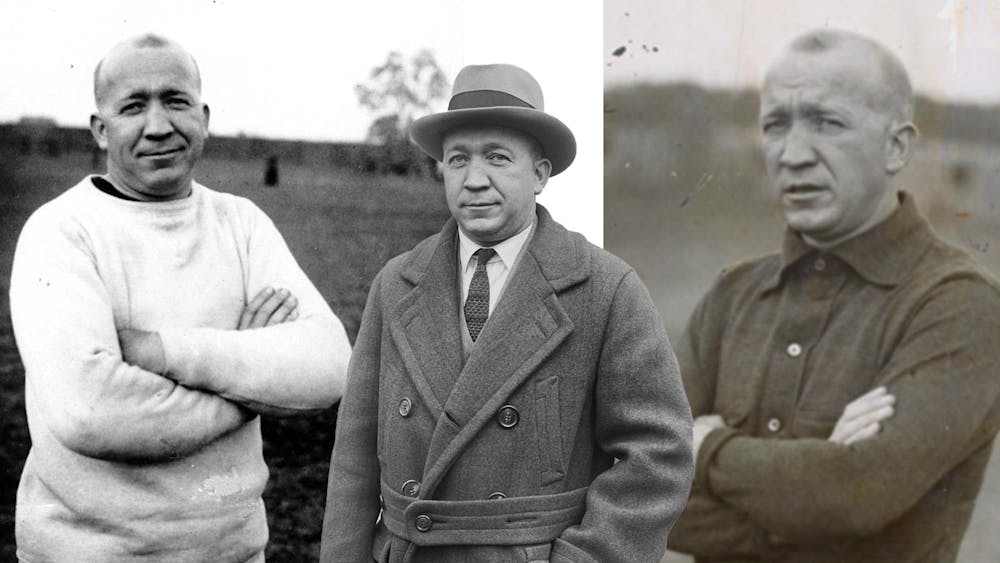“Bergman Island” (2021) was screened at the DeBartolo Performing Arts Center this past Wednesday as part of the Nanovic Institute for European Studies’ film series. The film is directed by French-Swedish director Mia Hansen-Love who follows two filmmakers and their relationship with each other and with famed director, Ingmar Bergman.
Bergman, a Swedish filmmaker, is considered one of the greatest filmmakers of all time. Bergman’s most famous films like “Seventh Seal” and “Persona” were released during the late 50s and early 60s and explored themes of spirituality, death and the identity. He would generally film at Faro, an island just off the coast of Sweden.
The movie follows a filmmaker couple who visit Faro to work on their respective projects and to get inspiration from Bergman’s legacy. The wife, Chris (Vicky Krieps), is troubled by Bergman’s bad relationship with his children — he married five times and was not involved in raising his own children. Chris’ husband, Tony (Tim Roth), is a more established filmmaker and doesn’t feel conflicted about separating Bergman’s art from his personal life.
Chris begins writing a film set on the island but struggles with her work. She reads her script out to Tony to get his thoughts. The film switches between these scenes of the film-within a film where Chris’ script plays out for the audience and back to the story-line with Tony. He is constantly distracted while Chris is sharing her work with him while the film within-a-film traces a passionate relationship which seems to be drawn from Chris’ own life, before her marriage.
The film is wonderfully meta — Chris and Tony’s relationship breaks down in the same house where Bergman filmed “Scenes From a Marriage” (1973), the series that caused many couples to divorce. The characters themselves seem to mirror the director’s own life — Mia Hansen-Love was in a long-term relationship with Olivier Assayas, the established French filmmaker who, like Tony, has an uncomplicated love for Bergman.
Of course, the film is not completely autobiographical. In an interview, Hansen-Love says that her experience of writing a film in Faro was very easy, unlike Chris’ struggles. Furthermore, she never visited Faro with Assayas. Peeling back the layers of what’s drawn from reality is a cinema trivia junkie’s game, but even for someone like me, a wannabe cinephile, it makes Hansen-Love’s brand of realism feel authentic.
Recent Scandinavian films in general have been exploring modern life with this similar sort of realism. Joachim Trier’s Norwegian film “The Worst Person in the World” (2021) is similar to “Bergman Island” in its exploration of creative ambitions and modern love. Protagonist Julie is a 30-year-old who still hasn’t settled on a career and struggles to cope with finding meaning in life. It also boasts beautiful cinematography that captures summer in Oslo in all its glory and hilarious commentary on the hypocrisy of social justice warriors online.
Danish director Thomas Vinterburg’s 2020 film “Another Round” follows four school teachers to tell an engaging and emotional story about mid-life crises and the worrying side effects of drinking culture. “Flee” (2021) uses animation and realism to explore the life story of an Afghan refugee in Denmark, evocatively capturing the trauma of alienation and exile.
The humor and realism of “Bergman Island,” along with its many Easter eggs, has inspired me to dive deeper into Bergman’s legacy and into Scandinavian cinema in general. It also made me consider fascinating questions about the relationship between art and artist — not just in terms of an artist’s problematic personal life, but also in terms of how artists insert themselves into their work while capturing universal experiences.
Title: “Bergman Island”
Starring: Vicky Krieps, Tim Roth, Anders Danielsen Lie
Director: Mia Hansen-Løve
If you like: “Marriage Story,” “Worst Person in the World,” “Scenes from a Marriage”
Shamrocks: 4 out of 5









